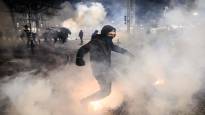Thousands of people protested in France on Thursday against the government’s decision to bypass the parliamentary vote and force through the controversial pension reform.
In the French capital, Paris, the police cleared the Place de la Concorde on Thursday evening of demonstrators protesting the government’s decision to bypass the parliamentary vote and force through the controversial pension reform.
Protests flared up after the government’s decision on Thursday. In the center of Paris, police used tear gas against protesters in the Place de la Concorde, located near the country’s parliament building, in the evening.
According to the Reuters news agency, there were approximately 7,000 protesters.
Some protesters tried to stay in the square, but the police used tear gas to subdue them, says the British Broadcasting Corporation BBC on its website (you will be transferred to another service).
The BBC reports that after the square was cleared, there were still individual clashes between the police and protesters elsewhere in Paris. Among other things, the demonstrators had set fires to block the streets.
According to Le Figaro (you will switch to another service) the police are trying to break up a crowd of about a hundred protesters. The newspaper also says that the police arrested 217 people who participated in the protest during the evening.
Rioting and clashes between the police and demonstrators were also observed in other major cities of the country. According to AFP reporters, shops were looted in Marseille in the south, while there were clashes between protesters and security forces in Nantes and Rennes to the west and Lyon to the east.
The pension reform, which aroused fierce opposition, raises the retirement age from 62 to 64.
There have been protests in France against raising the pension age for more than two months. Strikes have also been organized against the pension reform.
After the government’s decision, French unions immediately announced new strikes and demonstrations for next Thursday. The trade unions called the government’s decision a “complete denial of democracy”.
